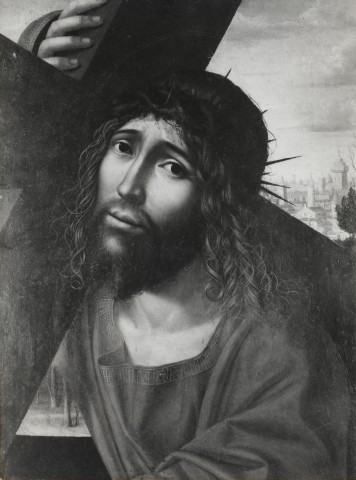Blessed Schuster’s Daily Thoughts on the Rule: Wednesday in Aperitione Aurium
Wednesday in aperitione aurium [in the opening of the ears]
Station at St Paul
The Man Born Blind
1. The Station is at the tomb of the Doctor of the Gentiles, who was healed from his blindness with holy Baptism. In ancient times, today the baptismal exorcisms were celebrated over the catechumens, and they were initiated into the reading of the Holy Gospels.
***
Let us note first of all the life of intimacy of the Apostles with the Lord. They conversed with Him in complete confidence, since He was in similitudinem hominum factus, et habitu inventus ut homo. (Phil 2:7: ‘Become like unto men and recognised truly as such.’)
Many times we keep ourselves at a respectful distance from Jesus Christ, because we know that He is God. We should reflect, however, that He, becoming man with us, desires to be regarded and treated by us more humano [in a human manner], as is done among men with persons of respect.
It is not said that the Apostles always had to tremble in His presence. They conversed with Him, they travelled with Him, they took food together, they questioned Him, they made objections, not lacking at times even a certain hilarity in their replies. ‘Lord’, Saint Peter once said, ‘the crowd is pressing on You from every side, and You still ask: ‘Who is it that touches Me?’ (Luke 8:45)
Saint Benedict wants to lift us up to this life of confidence and intimacy with Our Lord when, after having described the twelve degrees of humility, Monachus mox ad caritatem Dei perveniet illam, quae perfecta, foris mittit timorem. (Rule, Ch. 7: ‘The monk will soon be able to arrive at that divine love which, when it is perfect, excludes fear.’)
***
2. Before working the miracle, the Saviour wanted to put to the proof the obedience of the poor man born blind. He anoints Him first with the mud made with His spittle, and then orders him to descend the steps that led to the pool of Siloe, and to wash his eyes there.
The infirm man lets Him act, obeys punctually, and thus regains his sight.
Saint Benedict made the elogium of monastic obedience when in Chapter 71 of the Rule he promised: Scientes per hanc oboedientiae viam se ituros ad Deum. [‘Knowing that by this way of obedience they are to go to God’—tr.]
He calls it oboedientiae bonum, and compares the exercise of obedience to well-tempered and shining weapons against Satan and his aggressions.
The miracle of St Maurus who walks on the waters dry-footed sanctifies the beginnings of Benedictine obedience.
Saint Peter, too, when he walked dry-footed on the waves of the lake of Galilee, did so in obedience to the command of the Divine Master: Domine, iube me venire ad te super aquas. (Matt 14:28: ‘Order me, O Lord, to come unto Thee upon the waves.’)
***
3. After the healing of the man born blind, the Sanhedrin opens an enquiry, not in order to discover the truth, but in order to deny it.
For this purpose, they intimidate the parents of the one who has receive the favour, they are irritated with the frank admissions of the poor man who has been healed; nay, indeed, they have preventively given sentence of excommunication against whoever may have recognised Jesus as Messiah.
There is nothing worse than a soul which voluntarily closes its eyes to the sun, because it hates the light and does not want to be constrained to admit it.
This is what happens to anyone who abuses grace, to the point of twisting the divine teachings to make them say exactly the contrary. This what the heretics have often done.
Do you know why the world does not convert to the radiance of the Gospel preached by the Church?
Saint Paul says: ‘The god of this world (that is, Satan) has blinded the minds of the unbelievers; such that there does not shine on them the light of the Holy Gospel and the image of Christ which is reflected there.’ (2 Cor 4:4)
Meditate well, and fear for thyself. Qui stat, videat ne cadat. [1 Cor 10:12: ‘Let him who stands look out lest he fall.’—tr.]


